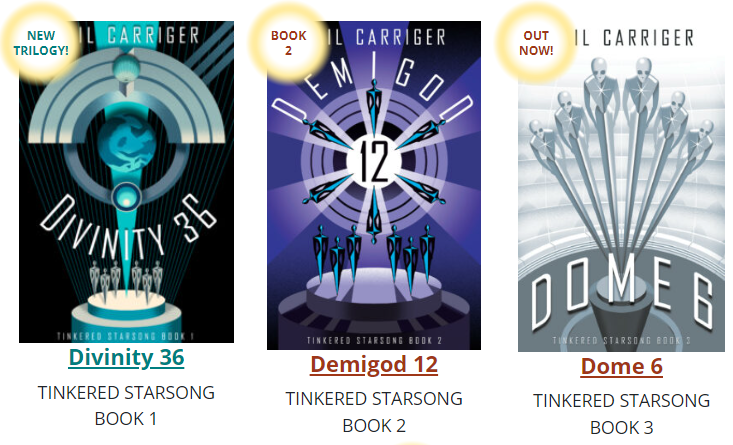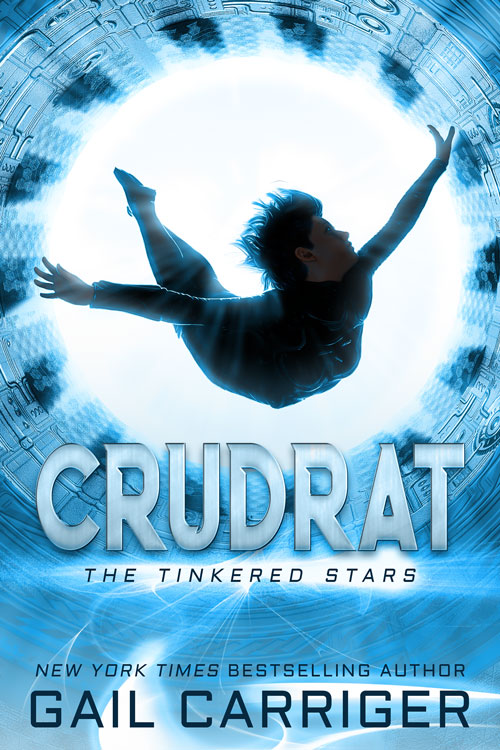
Right, it’s been a long time since my last review. Not because I’ve stopped reading, but because it can be hard to find the time to write a review. So, I’ve got a bit of a backlog. But what better way to break my fast, so to speak, than with Gail Carriger’s latest tasty series – Tinkered Starsong! This latest trilogy is in the same universe as Crudrat and The 5th Gender (Tinkered Stars), so there may be some very familiar elements in these books for you fellow Gail Carriger fans. But these books have all been released this year so SPOILER ALERT if you haven’t plowed through them like I have.
The first book in the new trilogy is Divinity 36. We start out on a moon, in a cafe with an escaped crudrat named Phex. He’s considered a refugee from the Wheel (talked about in Crudrat) and is just trying to make a living. He has no real ambition for himself, so it comes as a big shock when the Hollywood recruiter type aliens – the Dyesi – come into his little cafe and recruit him to be a god. Not a god in the all-powerful sense, but more like a god in the huge pop sensation sense, I think you could say.
The Dyesi recruit Sapiens to sing and dance under Domes. Domes, along with some Dyesi nymphs turn music into more than just songs – it’s beauty itself. And it causes something they refer to as god fix. People get so engrossed in the performance that they just sort of stop where they are. There are many gods and many pantheons (groups in the vein of BTK or ACE or other K-Pop favs) and cafes like Phex play their music non-stop. So he knows the songs and he knows the pantheons. He also knows that some people will do anything to become a god, and he’s just not like that.
Until the Dyesi recruiter comes into his cafe. He thinks about it and realizes that maybe he could get something out of it – a home. So he agrees to try out to be a god in exchange for Dyesi citizenship and off he’s shipped to Dyesi moon Divinity 36 (also the name of the first book). It isn’t smooth sailing. He almost fails because he’s just too insular to make it as part of a group – but eventually he finds his niche….It’s in the kitchen, with the ladles. And on the stage too, but particularly the kitchen. These books make me so hungry.
Demigod 12 is the second book in the series and in this one, Phex and his pantheon (a total of six Sapiens) are now demigods. They’re going on tour with the biggest pantheon of all time – Tillam, but something is wrong with them. Or more precisely, their “sun” – the core member/den mother of the group. In other words – Tillam’s Phex is sick. And because of that, Tillam is all but falling apart. And it doesn’t look good when gods get sick and possibly die. So the Dyesi put up and coming Asterism (Phex’s pantheon) on tour with Tillam and they quite take the galaxy by storm. But nothing really get’s settled in this book, because – obvs – it’s a trilogy. You can’t end in book two.
So the final book, and the most recently released is Dome 6. Dome 6 sees Asterism level up to full godly status. Phex gets to see the Dyesi homeworld and learns more about his fellow citizens, since he is now officially a Dyesi citizen. Asterism and Tillam also go to the homeworld of one of Asterism’s gods – Kagee – to build a new dome. Kagee’s homeworld is very, very xenophobic. It was a part of why he left. He’s not convinced that building a dome on his homeworld is a good idea, but he can’t get anyone but Asterism to listen to him.
He’s more than a little shocked to find his former lovers (yes, plural. Polyamory is the norm on his planet, especially due to their dwindling numbers) as the head of his planet. It isn’t smooth sailing, getting the dome up and running. We also learn that domes don’t just spread god fix to worshippers. They spread pacifism. It’s kind of fascinating, how Ms. Carriger explains it. I wouldn’t do it justice, so go read!
Of course, there are plenty of shenanigans. I don’t think it would be a Gail Carriger book without shenanigans. But there’s also plenty of serious items. There was one quote from Dome 6 that just sorta gut punched me with the profounds. “We are all a little lost, Phex. No matter where we are in the galaxy.” Said by the character Missit, who is generally a bit of a goof, but WOW. Also, can we talk about how absolutely fabulous the covers of these books are? They’re like some 20’s art deco sci-fi mashup and it’s glorious!
This is such an amazing series and such an amazing universe that I hope she makes more. I would love to know what happens in/with the Wheel. From the little we had in Crudrat, I find it a fascinating place. Also, I’d really love to find out what happened to Rees from that book. He wasn’t in there for very long, but I got attached. I also wouldn’t mind if we found out more about where Phex came from, but I kind of get the feeling that he himself doesn’t care anymore.
These books are a great series of found family and even found purpose. Phex finds a place for himself in the universe. There’s cooking, and learning new experiences and growing up. It’s a lovely, cozy sci-fi series that I absolutely can’t recommend enough! Rating: A for all of three books. Seriously, go out and read these.


 Man, I’d love to get back to blogging about books more often, but with an 18 month old, it’s hard to find the time and the energy. That being said, I just ploughed through the 7 (currently) novels of the Expanse Series by James S.A. Corey. I honestly think I got through all 7 books in about 2 weeks, 3 at the outside
Man, I’d love to get back to blogging about books more often, but with an 18 month old, it’s hard to find the time and the energy. That being said, I just ploughed through the 7 (currently) novels of the Expanse Series by James S.A. Corey. I honestly think I got through all 7 books in about 2 weeks, 3 at the outside
